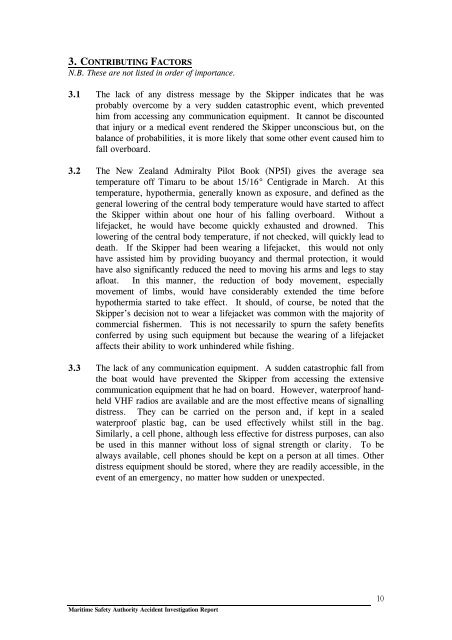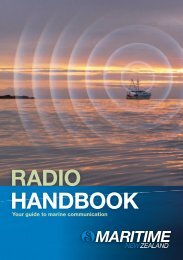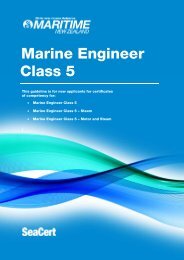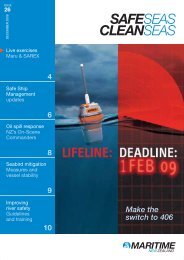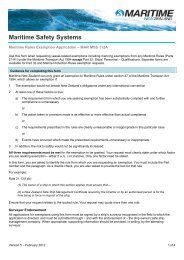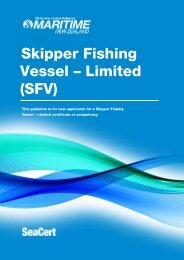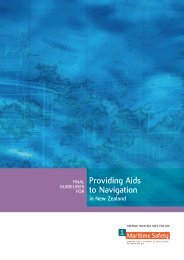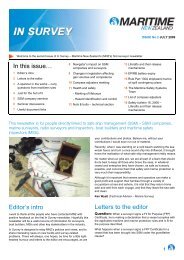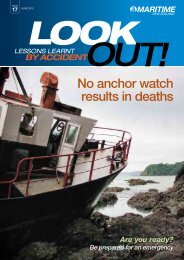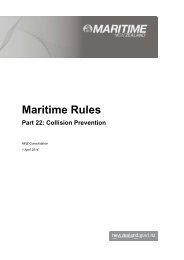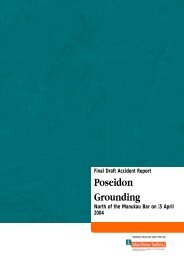Accident Investigation Report Commerial Fishing Diane Timaru ...
Accident Investigation Report Commerial Fishing Diane Timaru ...
Accident Investigation Report Commerial Fishing Diane Timaru ...
You also want an ePaper? Increase the reach of your titles
YUMPU automatically turns print PDFs into web optimized ePapers that Google loves.
3. CONTRIBUTING FACTORSN.B. These are not listed in order of importance.3.1 The lack of any distress message by the Skipper indicates that he wasprobably overcome by a very sudden catastrophic event, which preventedhim from accessing any communication equipment. It cannot be discountedthat injury or a medical event rendered the Skipper unconscious but, on thebalance of probabilities, it is more likely that some other event caused him tofall overboard.3.2 The New Zealand Admiralty Pilot Book (NP5I) gives the average seatemperature off <strong>Timaru</strong> to be about 15/16° Centigrade in March. At thistemperature, hypothermia, generally known as exposure, and defined as thegeneral lowering of the central body temperature would have started to affectthe Skipper within about one hour of his falling overboard. Without alifejacket, he would have become quickly exhausted and drowned. Thislowering of the central body temperature, if not checked, will quickly lead todeath. If the Skipper had been wearing a lifejacket, this would not onlyhave assisted him by providing buoyancy and thermal protection, it wouldhave also significantly reduced the need to moving his arms and legs to stayafloat. In this manner, the reduction of body movement, especiallymovement of limbs, would have considerably extended the time beforehypothermia started to take effect. It should, of course, be noted that theSkipper’s decision not to wear a lifejacket was common with the majority ofcommercial fishermen. This is not necessarily to spurn the safety benefitsconferred by using such equipment but because the wearing of a lifejacketaffects their ability to work unhindered while fishing.3.3 The lack of any communication equipment. A sudden catastrophic fall fromthe boat would have prevented the Skipper from accessing the extensivecommunication equipment that he had on board. However, waterproof handheldVHF radios are available and are the most effective means of signallingdistress. They can be carried on the person and, if kept in a sealedwaterproof plastic bag, can be used effectively whilst still in the bag.Similarly, a cell phone, although less effective for distress purposes, can alsobe used in this manner without loss of signal strength or clarity. To bealways available, cell phones should be kept on a person at all times. Otherdistress equipment should be stored, where they are readily accessible, in theevent of an emergency, no matter how sudden or unexpected.Maritime Safety Authority <strong>Accident</strong> <strong>Investigation</strong> <strong>Report</strong>10


